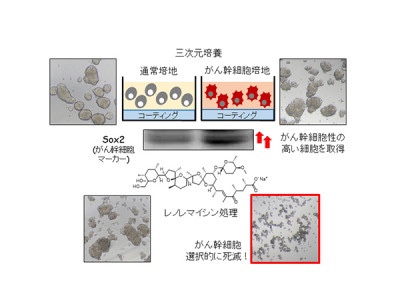
Kyoto University: Targeting cancer bosses!
– 30 times more effective in killing cancer stem cells –
-Drug Candidate to Prevent Recurrence: A Compound Called “Lenolemycin”-
November 18, 2022
Kyoto University
Juntendo University
A compound that can target cancer stem cells, which is considered to be the master of cancer, was discovered.
Lenolemycin:
It’s a compound called lenolemycin, which is made by microorganisms in the soil.
“The effect of killing cancer stem cells” is 30 times stronger than conventional drug candidate compounds.
Improved patient survival:
Collaborate with companies and aim for clinical trials (clinical trials) within 5 to 10 years.
Preventing cancer recurrence can improve patient survival.
Nihon Keizai Shimbun
https://www.nikkei.com/article/DGXZQOUF289WP0Y2A021C2000000/
Discovery of middle-molecular compound that selectively kills “cancer stem cells,” the kingpin of cancer ―Expectations for the development of new anticancer drug seeds targeting cancer stem cells―
Université de Kyoto : Cibler les patrons du cancer !
– 30 fois plus efficace pour tuer les cellules souches cancéreuses –
-Candidat médicament pour prévenir les récidives : un composé appelé « lénolémycine »-
18 novembre 2022
Université de Kyoto
Université Juntendo
Un composé qui peut cibler les cellules souches cancéreuses, considérées comme le maître du cancer, a été découvert.
Lénolémycine :
C’est un composé appelé lénolémycine, qui est fabriqué par des micro-organismes dans le sol.
“L’effet de tuer les cellules souches cancéreuses” est 30 fois plus fort que les composés candidats-médicaments conventionnels.
Amélioration de la survie des patients :
Collaborer avec les entreprises et viser des essais cliniques (essais cliniques) d’ici 5 à 10 ans.
La prévention de la récidive du cancer peut améliorer la survie des patients.
Nihon Keizai Shimbun
Découverte d’un composé de molécule moyenne qui tue sélectivement les “cellules souches cancéreuses”, la cheville ouvrière du cancer ―Attentes pour le développement de nouvelles graines de médicaments anticancéreux ciblant les cellules souches cancéreuses―
Universität Kyoto: Krebs-Bosse im Visier!
– 30-mal wirksamer bei der Abtötung von Krebsstammzellen –
-Medikamentenkandidat zur Verhinderung eines erneuten Auftretens: Eine Verbindung namens „Lenolemycin“-
18. November 2022
Universität Kyoto
Juntendo-Universität
Es wurde eine Verbindung entdeckt, die Krebsstammzellen angreifen kann, die als Meister des Krebses gelten.
Lenolemycin:
Es ist eine Verbindung namens Lenolemycin, die von Mikroorganismen im Boden hergestellt wird.
“Die Wirkung, Krebsstammzellen abzutöten”, sei 30-mal stärker als bei herkömmlichen Wirkstoffkandidaten.
Verbessertes Patientenüberleben:
Arbeiten Sie mit Unternehmen zusammen und streben Sie klinische Studien (Clinical Trials) innerhalb von 5 bis 10 Jahren an.
Die Verhinderung eines Wiederauftretens von Krebs kann das Überleben der Patienten verbessern.
Nihon Keizai Shimbun
Entdeckung einer mittelmolekularen Verbindung, die selektiv „Krebsstammzellen“, die Hauptursache von Krebs, abtötet
Identification of the polyether ionophore lenoremycin through a new screening strategy for targeting cancer stem cells
The Journal of Antibiotics
Abstract
Targeting and eradicating cancer stem cells (CSCs), also termed tumor-initiating cells,
are promising strategies for preventing cancer progression and recurrence.
To identify candidate compounds targeting CSCs,
we established
a new screening strategy with colorectal CSC spheres and non-CSC spheres in three-dimensional (3D) culture system.
Through chemical screening
using our system with in-house microbial metabolite library,
we identified polyether cation ionophores that selectively inhibited CSC sphere formation,
whereas CSC spheres were resistant to conventional anticancer agents.
One of the hit compounds,
the most selective and effective microbial metabolite lenoremycin,
decreased CSC populations via inducing reactive oxygen species production.
This study demonstrated that our newly established screening system
is useful for discovering agents that selectively eliminate CSCs.